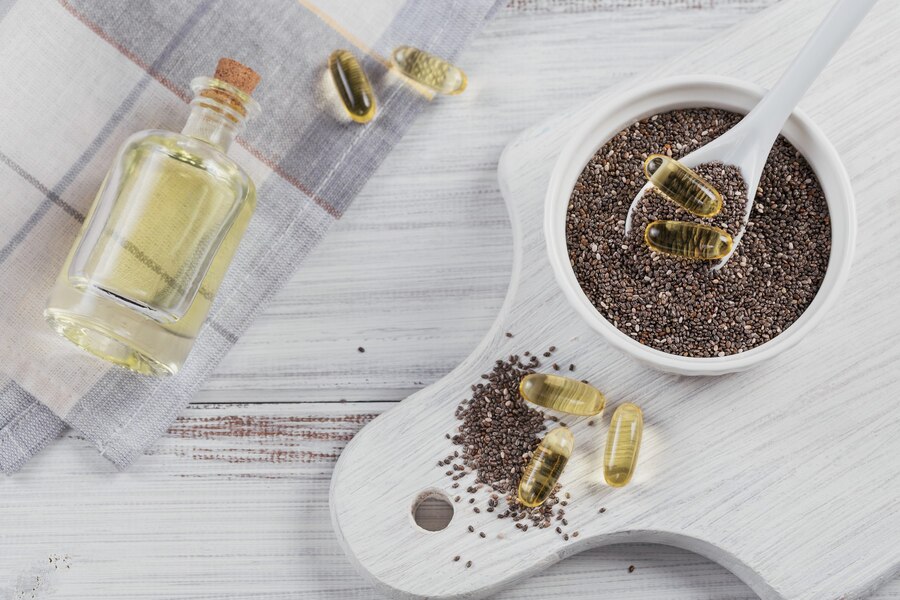Introduction to Ingredient
Ah, Vitamin F – the latest buzzword in skincare that’s been whispered about in hushed tones of reverence. But what exactly is it? Contrary to its mystical moniker, Vitamin F isn’t some elusive elixir brewed in a wizard’s cauldron. In reality, it’s a blend of essential fatty acids, namely linoleic acid (omega-6) and alpha-linolenic acid (omega-3), essential for maintaining skin health.
How Does it Work?
Picture your skin as a fortress, fending off invaders and retaining its precious moisture. Enter Vitamin F, the unsung hero fortifying the skin’s defenses. These fatty acids bolster the skin’s lipid barrier, trapping moisture and thwarting assailants like dryness and irritation.
Key Benefits
- Hydration and Moisture Retention: Vitamin F acts as your skin’s hydration coach, ensuring it stays plump and moisturized. Say goodbye to parched, desert-like skin and hello to a dewy, radiant complexion.
- Barrier Function: Think of Vitamin F as the bouncer at Club Skin – it keeps the riff-raff (read: pollutants and UV rays) out while locking in moisture.
- Anti-inflammatory Properties: Got skin that throws tantrums at the slightest provocation? Vitamin F’s got your back. Its omega-3 fatty acids swoop in to soothe inflammation, calming redness and irritation like a seasoned peacemaker.
- Eczema and Dermatitis Relief: For those plagued by pesky skin conditions, Vitamin F offers sweet relief. Bid adieu to the itchiness and discomfort of eczema and dermatitis with its anti-inflammatory prowess.
- Skin Barrier Support and Repair: Ever wish your skin came with a “Handle with Care” sticker? Vitamin F reinforces the skin’s natural barrier, patching up any chinks in its armor and ensuring it stays resilient against external aggressors.
- Wound Healing: When life throws lemons (or, you know, scrapes and scars), Vitamin F lends a healing touch. Its regenerative properties speed up the skin’s repair process, helping wounds vanish faster than your ex’s ghost.
Usage in Beauty Products
Now, you might be wondering: how can I get my hands on this skincare savior? Fear not, dear reader, for Vitamin F has infiltrated the beauty aisle in all its glory. From serums to moisturizers, it’s the VIP guest at every skincare party, promising hydration and radiance in a bottle.
- Facial Serums: Lightweight and fast-absorbing, Vitamin F-infused serums deliver a potent punch of moisture, leaving your skin feeling like silk.
- Moisturizers: Dry, parched skin, meet your match. Vitamin F-enriched moisturizers drench your skin in hydration, banishing flakiness and discomfort for good.
- Facial Oils: For an extra dose of decadence, facial oils infused with Vitamin F are your go-to. Lock in moisture and achieve that coveted lit-from-within glow with every drop.
Safety and Precautions
Before you slather on that Vitamin F goodness, a word of caution: patch test, patch test, patch test. While Vitamin F is generally safe for most skin types, there’s always the risk of sensitivities or allergies lurking beneath the surface.
Compatibility with Other Ingredients
Mixing and matching skincare ingredients can be a bit like chemistry class – sometimes explosive. But fear not, Vitamin F plays well with others, enhancing the efficacy of fellow ingredients like hyaluronic acid and vitamin C without causing any drama.
Scientific and Research Findings
Ah, the million-dollar question: does Vitamin F live up to the hype? While research on Vitamin F’s skincare benefits is still in its infancy, preliminary studies suggest promising results.
- Hydration and Moisture Retention: Scientists have observed that linoleic acid, a key component of Vitamin F, helps improve skin hydration and barrier function.
- Anti-inflammatory Effects: Omega-3 fatty acids, found in Vitamin F, exhibit potent anti-inflammatory properties, making them ideal for calming irritated skin.
- Skin Aging: Early research indicates that topical application of omega-3 fatty acids may have anti-aging effects, potentially reducing the appearance of fine lines and wrinkles.
Common Variants or Derivatives
Linoleic acid, linolenic acid, gamma-linolenic acid – oh my! Vitamin F comes in various forms, each with its own set of benefits and bragging rights. Whether you’re after hydration or inflammation relief, there’s a Vitamin F derivative for you.
Considerations When Using the Product
While Vitamin F may seem like a skincare godsend, it’s essential to temper your expectations. Remember, no single ingredient can work miracles overnight. Consistency is key, so stick with your skincare routine like it’s your morning coffee – non-negotiable.
References
- Lee, E., & Kim, J. (2017). Topical Lipids: Occlusive, Barrier, and Penetration Enhancing. Skin Therapy Letter, 22(5), 5–7.
- Lin, T. K., Zhong, L., & Santiago, J. L. (2017). Anti-Inflammatory and Skin Barrier Repair Effects of Topical Application of Some Plant Oils. International Journal of Molecular Sciences, 19(1), 70.
- Nicolaou, A. (2017). Eicosanoids in skin inflammation. Prostaglandins, Leukotrienes and Essential Fatty Acids, 127, 66–69.
Conclusion
So, is Vitamin F the skincare holy grail we’ve been waiting for? Maybe. While it won’t magically transform you into a flawless goddess overnight, it certainly has its perks. With its hydration-boosting, inflammation-soothing, and barrier-strengthening properties, it’s a worthy addition to any skincare routine.
Frequently Asked Questions (FAQs)
- Can I use Vitamin F if I have oily skin? Absolutely! Vitamin F can help regulate sebum production and keep your skin hydrated without clogging pores.
- Is there a difference between Vitamin F and other fatty acids like omega-3 and omega-6? Vitamin F is a term used to describe essential fatty acids, including omega-3 and omega-6, which are crucial for maintaining healthy skin.
- Can I use Vitamin F during pregnancy? While there’s no evidence to suggest that Vitamin F is harmful during pregnancy, it’s always best to consult with your healthcare provider before introducing any new skincare products into your routine.



